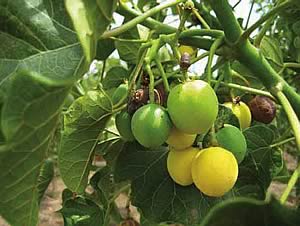 |
|||||||||
|
|||||||||||||||||||
|
|
Jatropha - a Bioenergy Crop for the Poor 2010-07-22 Using the energy crop jatropha for biodiesel production could benefit poor farmers, particularly in semi-arid and remote areas of developing countries, according to a report published by FAO and the International Fund for Agricultural Development (IFAD).
But the report stresses that jatropha is still essentially a wild plant sorely in need of crop improvement. Expecting jatropha to substitute significantly for oil imports in developing countries is unrealistic. "Many of the actual investments and policy decisions on developing jatropha as an oil crop have been made without the backing of sufficient science-based knowledge," the report said. "Realizing the true potential of jatropha requires separating facts from the claims and half-truths." A promising crop Jatropha curcas L. grows reasonably well in dry areas on degraded soils that are marginally suited for agriculture. The roots of the low-growing jatropha trees reach water deep in the soil. The surface roots assist in binding the soil and can reduce soil erosion. Jatropha seeds can be processed into lesser polluting biodiesel than fossil diesel to provide light and cooking fuel for poor rural families. Seed cake, a by-product from this process may be valuable as fertilizer and animal feed after detoxification. Unlike other major biofuel crops, such as maize, jatropha is not used for food and it can be grown on marginal and degraded lands where food crops can not grow. In 2008, jatropha was planted on an estimated 900 000 hectares globally, 760 000 in Asia, 120 000 ha in Africa and 20 000 ha in Latin America. By 2015, it is estimated that jatropha will be planted on 12.8 million ha. The largest producing country in Asia will be Indonesia. In Africa, Ghana and Madagascar will be the largest producers, in Latin America it will be Brazil. The report says jatropha has the biggest potential in dry and remote areas where - because of the high price of inputs such as fertiliser and transport costs - food production is not competitive. However, to obtain sustained yields in degraded soils in dry areas, inputs such as water and fertilizer are needed. Particularly smallholder farmers, oil mill outgrowers and members of community plantation schemes or workers on private-enterprise jatropha plantations can earn an income from jatropha production. The cultivation of jatropha would be particularly beneficial to women because milling machines powered by engines fuelled with jatropha oil reduce the amount of tedious work they must do. Replacing traditional biomass cooking fuels with cooking stoves that run on jatropha oil is also healthier, as cooking is done in a smoke-free environment, and women do not have to spend time gathering fuel wood. The lower use of fuel wood also relieves pressure on forest resources. "Jatropha could eventually evolve into a high yielding crop and may well be productive on degraded and saline soils in low rainfall areas," the FAO/IFAD report said. "Its by-products may possibly be valuable as fertilizer, livestock feed, or as a biogas feedstock, its oil can have other markets such as for soap, pesticides and medicines, and jatropha can help reverse land degradation." Room for improvement But the FAO/IFAD study also stressed that, because the plant has undergone little crop improvement, its seed yields, oil quality and oil content are all highly variable. Most of the jatropha currently grown is toxic which renders the seedcake unsuitable for use as livestock feed and may present a human safety hazard. Research for better non-toxic jatropha varieties, quality seed and improved agronomic practices, including conservation agriculture and integrated pest and nutrient management should also be supported, the report said.
|
||||||||||||||||||

|
|
||||||||||||||||||
| home | agri-services | pedigree
pen | news | dairy | beef | machinery property | organisations | site map |
|||||||||||||||||||


